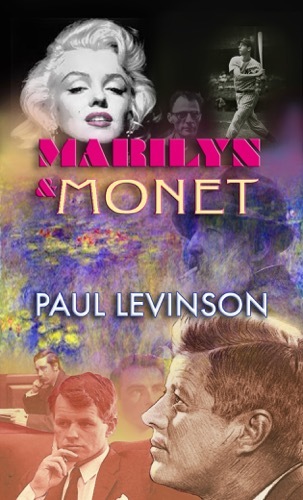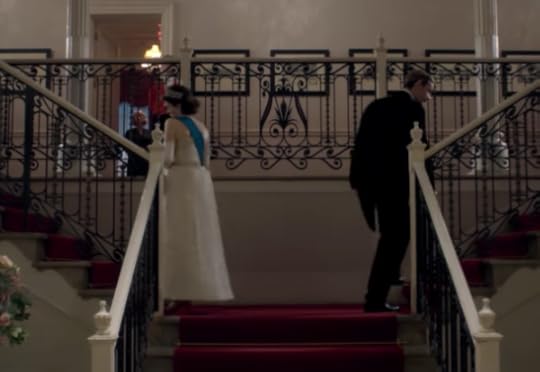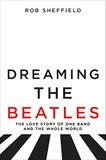Paul Levinson's Blog: Levinson at Large, page 201
December 21, 2017
Knightfall 1.3: Baby
 A fine Knightfall 1.3 last night, which revolves around Queen Joan finding out she's pregnant - with Landry's baby. Since she hasn't slept with her husband King Philip in two years (!), this poses something of a problem.
A fine Knightfall 1.3 last night, which revolves around Queen Joan finding out she's pregnant - with Landry's baby. Since she hasn't slept with her husband King Philip in two years (!), this poses something of a problem.Her first plan/hope is maybe she and Landry can run away together someplace safe and far from the King. But she never even gets the chance to tell Landry about their baby, after he, counseled by the Pope, tells her he can't continue their relationship.
The episode ends with Joan putting a small bottle of a powerful and dangerous abortion-inducing potion to her lips. No one asked me, but I have a better idea:
Why doesn't Joan put aside the potion and sleep with the King? She's not that far along with her pregnancy, so couldn't she plausibly say the baby was the King's? This would also have the big narrative benefit of Landry at some point learning that Philip and Joan's baby (or child, if later) was his.
Meanwhile, he'll have enough to keep him occupied in the tug of war between England and Catalonia over Isabella, and making sure it doesn't turn into a real war. Not to mention the dire words of his Arabic captive.
The essence of the Templars is fighting against overwhelming odds, and Knightfall has put plenty of that on table. Which makes for good viewing ahead.
See also: Knightfall 1.1: Possibilities ... Knightfall 1.2: Grail and Tinder

Paul Levinson's books ... Paul Levinson's music
Published on December 21, 2017 08:52
December 20, 2017
Vikings 5.5: Meet Lawrence of Arabia
 The first part of tonight's Vikings 5.5 was about as good as it gets in the fierce battle action, as Aethelwulf and Heahmund fight Ivar and company - who resurface from the Roman tunnel beneath York - and send the King into retreat and capture the Bishop. These two sides are so evenly matched that I never can tell who is going to win - though, so far, it's usually the Vikings.
The first part of tonight's Vikings 5.5 was about as good as it gets in the fierce battle action, as Aethelwulf and Heahmund fight Ivar and company - who resurface from the Roman tunnel beneath York - and send the King into retreat and capture the Bishop. These two sides are so evenly matched that I never can tell who is going to win - though, so far, it's usually the Vikings.The admiration Ivar has for Heahmund replays what Ragnar felt for Athelstan all those years ago, including Ivar taking the Bishop hostage and back to the Norse homeland. I have a feeling, though, that Heahmund will fare better than Athelstan, may even go on to Christianize some of the Vikings. We'll have to see.
Floki will likely be gone by the time Ivar and Heahmund reach Kattegat, but it would be interesting indeed to see the two confront one another, given their profound belief in such different gods. (By the way, although Floki is played by Gustaf Skarsgård, as he always was, he sure looks different this season.)
And speaking of gods, it was fun to see Bjorn and his men in the land of Allah - sort of the Vikings meeting Lawrence of Arabia, with the Emir played someone who even looks a lot like Omar Sharif. This part of the story has moved up to a close second behind what happened in England, and may overtake it, with Ivar's return to Scandinavia.
As I said in an earlier review, I'm enjoying this 5th season of Vikings more than the previous, and I'm very much looking forward to more.
See also Vikings 5.1-2: Floki in Iceland ... Vikings 5.3: Laughing Ivar ... Vikings 5.4: Four of More Good Stories
And see also Vikings 4.1: I'll Still Take Paris ... Vikings 4.2: Sacred Texts ...Vikings 4.4: Speaking the Language ... Vikings 4.5: Knives ... Vikings 4.8: Ships Up Cliff ... Vikings 4.10: "God Bless Paris" ... Vikings 4.11: Ragnar's Sons ... Vikings 4.12: Two Expeditions ... Vikings 4.13: Family ... Vikings 4.14: Penultimate Ragnar? ... Vikings 4.15: Close of an Era ... Vikings 1.16: Musselman ... Vikings 1.17: Ivar's Wheels ...Vikings 1.18: The Beginning of Revenge ... Vikings 4.19: On the Verge of History ... Vikings 4.20: Ends and Starts
And see also Vikings 3.1. Fighting and Farming ... Vikings 3.2: Leonard Nimoy ...Vikings 3.3: We'll Always Have Paris ... Vikings 3.4: They Call Me the Wanderer ... Vikings 3.5: Massacre ... Vikings 3.6: Athelstan and Floki ...Vikings 3.7: At the Gates ... Vikings 3.8: Battle for Paris ... Vikings 3.9: The Conquered ... Vikings Season 3 Finale: Normandy
And see also Vikings 2.1-2: Upping the Ante of Conquest ... Vikings 2.4: Wise King ... Vikings 2.5: Caught in the Middle ... Vikings 2.6: The Guardians ...Vikings 2.7: Volatile Mix ... Vikings 2.8: Great Post-Apocalyptic Narrative ... Vikings Season 2 Finale: Satisfying, Surprising, Superb
And see also Vikings ... Vikings 1.2: Lindisfarne ... Vikings 1.3: The Priest ... Vikings 1.4: Twist and Testudo ... Vikings 1.5: Freud and Family ... Vikings 1.7: Religion and Battle ... Vikings 1.8: Sacrifice
... Vikings Season 1 Finale: Below the Ash

historical science fiction - a little further back in time
Paul Levinson's books ... Paul Levinson's music
Published on December 20, 2017 21:07
Synchronicity: Primer meets Predestination
 There's something about the end of the year that gets me especially in the mood for time travel. Fortunately Netflix came along to feed that urge.
There's something about the end of the year that gets me especially in the mood for time travel. Fortunately Netflix came along to feed that urge.I'd say Synchronicity, on iTunes since January 2016 and then Netflix - i.e., for almost two years, so how did I miss it? maybe I was in a parallel universe? - has elements of two classic time travel movies, Primer and Predestination (well, I'm not sure Predestination is yet a classic, but it's based on a stone classic of a science fiction story, Robert Heinlein's "All You Zombies," which makes it based on his earlier "By His Bootstraps," too). Synchronicity starts out and for a bit and here and there captures that college-kids-build-a-time-machine ambience of Primer, but goes on to pretty decently and with sufficient tension and intellectual complexity get that time-traveler-chasing-his-own-tail story of Predestination. And just for good measure, there's a something of the time-traveler-chasing-his-own-tale, too. Really. (I also have to mention that there's a little tale called Synchronicity which I know well because I wrote it - Buzzymag published in 2014 - but it has nothing to do with time travel.)
Now one of the things about chasing your own tail/tale through time - even just accidentally running into yourself - is you have to be careful when telling the story (making the movie) to sooner or later account for everything the time-traveler encounters in the early and middle parts of the story. Jacob Gentry (who directed, and also co-wrote this with Alex Orr) did an excellent job of this. There's a good romantic element, and a bad guy played by Michael Ironside, whom you can't go wrong with in these kinds of stories.
One thing I wasn't wild about was the meme that meeting yourself in the past or the future is bad for your heath and even worse. Obviously, that could and should cause what could be severe psychological trauma, as new memories suddenly start pouring into your later version's head. But the idea that such meetings are physically destructive is a trope that the 12 Monkeys TV series as well as Synchronicity the movie use as a given, without much real explanation.
All in all, though, I enjoyed Synchronicity, and give it credit for presenting time travel seriously and entertainingly. Give it a shot if you're a time traveler in fiction like me.

It started in the hot summer of 1960, when Marilyn Monroe walked off the set of The Misfits and began to hear a haunting song in her head, "Goodbye Norma Jean" ... Paul Levinson's books ... Paul Levinson's music
Published on December 20, 2017 00:02
December 19, 2017
ARQ: Here We Go Loop De
 Hey, I just finished watching ARQ - more than a year after it was first released on Netflix - a time-loop Groundhog Day meets I don't know, Terminator movie, about a couple in a facility near the end of the world in some desperate battle, obliged to relive a few hours over and over again, because every time they're killed by masked then unmasked intruders, they wake up in the same bed, together, with memories (usually) of what happened to them in the earlier loops. This is because the guy is the programmer of a machine that can (presumably) run forever because it keeps regenerating its energy, by thrusting itself and those in its vicinity a little bit back into the past.
Hey, I just finished watching ARQ - more than a year after it was first released on Netflix - a time-loop Groundhog Day meets I don't know, Terminator movie, about a couple in a facility near the end of the world in some desperate battle, obliged to relive a few hours over and over again, because every time they're killed by masked then unmasked intruders, they wake up in the same bed, together, with memories (usually) of what happened to them in the earlier loops. This is because the guy is the programmer of a machine that can (presumably) run forever because it keeps regenerating its energy, by thrusting itself and those in its vicinity a little bit back into the past.Got it? Believe or not, for a variety of reasons not at all realed to the movie, it took me a bunch of nights to watch this movie, for reasons having nothing to do with this movie, but there was no need rewind, since no one was attacking me. And I did recall everything that happened earlier in the movie.
ARQ has a pretty good plot. The guy loves the woman, and she loves him, though their political affiliations aren't quite what they seem to be. There's no need to worry about being killed - well, it is an inconvenience, because it can get in the way of their plans - but no huge deal, because the death of either one and especially both seems to trigger the time loop aka the reseting of time by the machine. Apparently.
By the way, ARQ is the name of the machine - which is an acronym for arcing recursive quine, which is a pretty accurate description of what the machine does, check out what the word "quine" means on Google - and this is pretty neat little movie, though something happens at the very very end which is a little too unclear for my metaphysics.
But if you have a weakness for loops - which I obviously do - see ARQ. And maybe see it again. But not again, unless ...

watch The Chronology Protection Case FREE on Amazon Prime Paul Levinson's books ... Paul Levinson's music
Published on December 19, 2017 20:28
Why Is Time Travel So Pleasurable?

time-travel stories about Orson Welles, John Lennon, David Bowie, more
Why is time travel so pleasurable? I mean to read or watch on the screen or listen to in a radio play or an audio book - and, in my case, to write - because I am sure I've never actually time traveled (living into the future a moment at a time is not actually time travel, in my book, which would entrail traveling to the future faster or slower than in normal time or traveling to the past at all). And I'm almost as sure which is to say very sure that no one else has ever time traveled, or will time travel, either.
And that's why time travel is my favorite kind of science fiction, which makes it my favorite kind of fiction, period - precisely because it’s almost certainly impossible. Not like travel to other planets, which makes great science fiction, but we're already beginning to do in reality. Or artificial intelligence and robots, which also makes for great science fiction, but we're also already beginning to do, a least little. But time travel is different because it's so likely impossible - as far we know, we're not doing any of it today, and have never done it. As far as we know, no one from the future has yet to pay us a visit. And because time travel is so likely impossible, seeing how time travel stories can work, can make sense, anyway, is a special kind of enjoyable.
Why is time travel impossible? Well, if you travel to the past to change whatever event, and you succeed, how would you have had knowledge about the event you went back to change in the first place? This is often called the grandfather paradox – if you go back in time and accidentally kill your grandfather, then you wouldn’t have been born, so how could you have gone back in time in the first place? But actually there’s no need to kill anyone in your ancestral family for this paradox to be upon you, the time traveler. Anything you do, when you travel back in time, that invalidates the reasons or necessary ingredients for the trip, would trigger the paradox.
There are lots of ways out of this, such as the multiple-worlds interpretation, which works like this: Time traveler 1 (TT1) from World 1 travels back in time, and accidentally prevents either set of grandparents (or parents) from meeting. So TT1 is never born. And in that world - call it World 2 - since TT1 doesn’t exist, there may never be any time travel. But that’s ok, because it was TT1 from W1 who went back in time, stopped the grandparents or parents from meeting, which resulted in W2 with no TT1 or TT2. So: no paradox at all with these multiple worlds.
But if our existence really consisted of an infinite number of multiple worlds or realities, with a new one triggered with every drop of the time traveler's figurative hat, that would make for an existence far more insane than just our normal world would be with time travel, right? I mean, a new world created with every drop of the time traveler's hat, or even if no hat is dropped, by the time traveler just catching someone's eye at just the right or wrong time, and distracting that person for some kind of crucial instant - well, hey, that's even crazier than time travel, right?
All right, but what about travel to the future? No grandparent paradoxes there, but we run into other serious problems. If I travel one day into the future, and I see you wearing a blue hat, what does that mean for you? That you have no choice but to wear a blue hat? Well I don’t know about you, but I think I have a choice about what color hat to wear tomorrow, or not wear any hat at all. We call that free will. Don’t you think you have that ability too, or do you think everything you do from now on is available to the scrutiny of anyone in your vicinity who travels into the future, which would result in your doing just that, and only that, whatever other ideas you might have between right now and tomorrow about what to wear on your head or otherwise do tomorrow?
Time travel is such a pleasurable exercise for the mind that I get a kick just thinking about it, making the impossible seem possible, and writing stories and novels with those paradoxes and loops. But reading a great novel like Isaac Asimov’s The End of Eternity or Robert Heinlein's The Door Into Summer, or seeing a movie like Back to the Future (any of the three) or 12 Monkeys or Primer, or a new television series like Travelers (back next week for its second season) or Dark or Erased (all on Netflix) – well, that’s always a big treat indeed. If you’ve read this far, I’d bet that at least some part of your brain agrees … at least, in this timeline.

It started in the hot summer of 1960, when Marilyn Monroe walked off the
set of The Misfits and began to hear a haunting song in her head,
"Goodbye Norma Jean" ... Paul Levinson's books ... Paul Levinson's music
Published on December 19, 2017 18:51
December 17, 2017
The Girlfriend Experience 2.11-12: Cinematography and Future
 One of the best things about The Girlfriend Experience - both stories - is the cinematography. In tonight's 2.11-12 double feature, we get Bria escaping from the courthouse and walking into sheer white aka outside before she catches a cab. And we get Erica's office looking even starker than usual, even though it's looked like that from the outset. But it fits perfectly with her mood and situation.
One of the best things about The Girlfriend Experience - both stories - is the cinematography. In tonight's 2.11-12 double feature, we get Bria escaping from the courthouse and walking into sheer white aka outside before she catches a cab. And we get Erica's office looking even starker than usual, even though it's looked like that from the outset. But it fits perfectly with her mood and situation.As to the stories, well, it's a little hard to believe that Bria could just walk of the courthouse like that - almost right under Ian's nose. Or that the judge or bailiff of whoever's responsibility it is would not be standing outside the door of the restroom (ok, it wouldn't be the judge, but it would be someone, right?)
And though Erica's heartbreak is understandable, would she be in such bad shape as to miss the next day at work? But there were at least two good moments in Erica's story (with, alas, little Anna tonight). First, the calendar says October 2018, which means this is taking place about a year into the future, and I don't think we knew that before (or maybe we did, but I got distracted). And, second, her incredibly helpful secretary turns out to be a spy.
That explains both why she was helpful to Erica when she was so drunkenly out of it, and why she didn't take advantage of Erica when she was in that condition and state of undress. The other explanation, that the secretary's not gay, seems unlikely, since just about every other major woman apparently is in this story.
Next week's the season's double finale. And, despite my sarcasm above, I'm sorry to see it end so soon. Both stories do have a lot going for them.
See also The Girlfriend Experience 2.1-2: Two for One ... The Girlfriend Experience 2.3-4: Hard to Come By ... The Girlfriend Experience 2.5-6: In and Out ... The Girlfriend Experience 2.7-8: Sundry Seductions ... The Girlfriend Experience 2.9-10: The End of Illusions
And see also The Girlfriend Experience: Eminently Worth It (my review of Season 1)

It all started in the hot summer of 1960, when Marilyn Monroe walked off the set of The Misfits and began to hear a haunting song in her head, "Goodbye Norma Jean" ... Paul Levinson's books ... Paul Levinson's music
Published on December 17, 2017 21:12
The Crown season 2: Standing Ovation

The Crown season 2 on Netflix exceeded season 1 - which was excellent - on all levels, which is to say it's a 10-episode tour-de-force, with stories ranging from flashbacks in 1934 Nazi Germany (where Philip lived as a boy) to JFK and Jackie in Buckingham Palace. Each episode was a gem, and most revolved around Elizabeth and Philip, but the final three were something else, extraordinary, indeed.
The 8th episode was about JFK and Jackie. We're introduced to I guess would could be called the British perspective on America's Camelot - because I have no idea to what extent what is portrayed is true. (An earlier episode with abdicated King Edward said to have hobnobbed with Hitler ends with real photos of Edward and the Fuhrer, but no such proof is presented about JFK and Jackie.) Both are portrayed as a little different from what we usually think of them. JFK is jealous of Jackie, and nearly manhandles her as he expresses his displeasure to her about being the "man who accompanied Jacqueline Kennedy to Paris". And Jackie, for her part, is portrayed as at times more rude, and more vulnerable, than we might have thought. But the impact of JFK's assassination on Elizabeth is something which we (the public) had no knowledge of before. We've seen the assassination and its impact on the screen many many times. But The Crown manages to present it in a different, equally intense and deeply moving, light.
The 9th episode is all about Prince Charles and his father Prince Philip (played by Matt Smith, who deserves an Emmy for this performance - as does Claire Foy as Elizabeth). In a single hour, Philip's and Charles's personas are explained - again in a way we haven't seen before. If The Crown were a Shakespearean tragedy, this episode amply shows that both Philip and Elizabeth were both central protagonists - Philip in this one, especially, Elizabeth in all the others.
And the final episode about the Profumo scandal, culminating in a renewal of Elizabeth and Philip's relationship, was a masterpiece in itself. Philip is caught up in the scandal because he knew Dr. Ward - Philip was treated by him - and Elizabeth has reason to think that Ward found all kinds of ways to relieve Philip's "tensions". Earlier, Elizabeth has some of the best lines in the series when she softly lashes out at Harold Macmillan, her Prime Minister, who is resigning mostly because Profumo (Macmillan's Secretary of War, who was implicated in the call-girl ring which involved a Soviet spy - some things never change) was an embarrassment Macmillan couldn't overcome. Elizabeth notes that in the extent of her reign - at this point, some ten years - three Prime Minsters have seen fit to jump ship. They constitute "a confederacy of quitters," she tells Macmillan. This, of course, is unfair to everyone accept Macmillan - both Churchill and Eden were forced out by the their party - but it's a great line from Elizabeth, anyway.
Left Bank Pictures and Sony Pictures Television are already at work on a new season - with new people in the roles of Elizabeth and Philip, as befits their older ages. A standing ovation for Foy and Smith, and everyone involved in these first two seasons.

It started in the hot summer of 1960, when Marilyn Monroe walked off the set of The Misfits and began to hear a haunting song in her head, "Goodbye Norma Jean" ... Paul Levinson's books ... Paul Levinson's music
Published on December 17, 2017 18:46
Erased: Finding His Way to the Real Timeline
 One of the pleasures of Netflix is finding a movie or a TV series you never heard of, likely never would have, and finding it to be a gem. Erased (aka Bokudake ga Inai Machi), just up on Netflix this weekend, is such a series.
One of the pleasures of Netflix is finding a movie or a TV series you never heard of, likely never would have, and finding it to be a gem. Erased (aka Bokudake ga Inai Machi), just up on Netflix this weekend, is such a series.It's 12 episodes, 30 minutes or less each, and time travel. How could I resist? It's in Japanese, with English subtitles, and its lead character experiences what he calls "revivals," or flipping back briefly into the past, to save someone in danger. That is, until his mother is murdered, he's a suspect, and he finds himself 18 years in the past, in the body of his younger self - in grade school - and determined not only to save his mother, but a group of girls who have been kidnapped and murdered back then.
Beautifully photographed, with shimmering snow scenes and rusty sunrises and even smoking factories that set the ambience, Erased is told with delicacy and depth, and excellent performances by Yûki Furukawa as 29-year-old Satoru, RiRia as 10-11-year old Satoru, and all the other kids and adults in the series. There's no explanation given for the time travel, which makes Erased more fantasy or magical realism that science fiction, but that's just fine for this softly focused story.
Satoru's key problem, tied to stopping the murders, is which reality he in effect creates by changing something in the past is the one that was meant to be? The ending provides a satisfying answer. I was able to spot the serial killer pretty early on, but since so much of the story was what Hitchcock called suspense (knowing there's a bomb ticking on a bus) not surprise (there's an unexpected explosion), that worked well for me, too. Good job by director Ten Shimoyama and writer Kei Sambe. Special kudos for outstanding cinematography to Koshi Kiyokawa.
Check our Erased for a very different kind of time travel story, with lots of narrative in grade school, but a profundity that transcends age.

watch The Chronology Protection Case FREE on Amazon Prime Paul Levinson's books ... Paul Levinson's music
Published on December 17, 2017 00:37
December 15, 2017
The Discovery: Worth Finding
 The Discovery (2017, Netflix) is a strange, edgy, powerfully soft-spoken movie about a scientific attempt to find, map, and understand the afterlife. As such, it bears some resemblance to Kiefer Sutherland's 1990 Flatliners (coincidentally remade in 2017, but I haven't yet seen it). The Discovery sports Robert Redford in a quite central role, with Jason Segel, Rooney Mara (House of Cards), Jesse Plemons (Friday Night Lights), and Riley Keough (first season of The Girlfriend Experience) in leading and strong supporting roles.
The Discovery (2017, Netflix) is a strange, edgy, powerfully soft-spoken movie about a scientific attempt to find, map, and understand the afterlife. As such, it bears some resemblance to Kiefer Sutherland's 1990 Flatliners (coincidentally remade in 2017, but I haven't yet seen it). The Discovery sports Robert Redford in a quite central role, with Jason Segel, Rooney Mara (House of Cards), Jesse Plemons (Friday Night Lights), and Riley Keough (first season of The Girlfriend Experience) in leading and strong supporting roles.As for the plot, it's somewhat murky - as I guess befits afterlife stories - and manages to combine the ambience of grade-B 1950s science fiction/horror, replete with a hokey laboratory, more than reminiscent of the Frankenstein-monster set-up, and the more modern retelling of early events and dialogue in the movie, near the end, in a way which makes the beginning make more sense, though it wasn't all that opaque in the first place.
Redford is the scientist who thinks/claims he has discovered evidence of an afterlife. His son (played by Segel) resists this because it's somehow tied up with the death of his mother. He in turns falls for Mara's character, who has a complex story of her own. I won't tell you more, lest I give too much away. In other words, I'd like to see this movie have an afterlife.
All in all, I'd say the best part about it is the at-once jarring, compelling, and subtly controlled way in which the movie was shot, including a long speechless scene with Rooney on camera, thinking about something, sitting next to Segel on the beach, about to tell him a crucial piece of this story. That kind of pacing is realistic and hard-to-find in science fiction. Kudos to film maker Charlie McDowell.

It started in the hot summer of 1960, when Marilyn Monroe walked off the set of The Misfits and began to hear a haunting song in her head, "Goodbye Norma Jean" ...
Paul Levinson's books ... Paul Levinson's music
Published on December 15, 2017 15:27
Review of Rob Sheffield's Dreaming the Beatles 19 of X: (Unnecessary but Brilliant) Defense of McCartney
 Next up in Rob Sheffield's one-of-a-kind Dreaming the Beatles, which I've been reviewing here now about a chapter a month, because that's the way I like it, is an outstanding defense of Paul McCartney, as only Sheffield with his combination of depth, irreverence, and sheer style could do it.
Next up in Rob Sheffield's one-of-a-kind Dreaming the Beatles, which I've been reviewing here now about a chapter a month, because that's the way I like it, is an outstanding defense of Paul McCartney, as only Sheffield with his combination of depth, irreverence, and sheer style could do it.The thing is - as you'll know from reading almost any one of my previews reviews here (see list at end of this review) - is I don't think McCartney needs any defense. I find people who don't like his music tone-deaf, jealous, or at best marching to a drummer so different from mine that I have nothing to say to them. It's not that I love every song McCartney has written and recorded. It's just that I love more of them then I do any other artist's. It's not that I don't love Lennon just as much, and that I don't acknowledge that many of Lennon's songs, from when he was with the Beatles (like "Rain") and when he was on his own (like "Jealous Guy" or even "Whatever Gets You Through the Night") as easily as good as or even better than McCartney's best. It's just I've gotten a little more, in sum, over the years, from McCartney's music than from Lennon's, and this was so even before the unassailably tragic day when Lennon was murdered (my Loose Ends Saga concludes with a time-traveling plan to prevent that).
And it's not that I agree with every move McCartney has made outside of the studio, either. On a personal level, I imagined that McCartney would contact me after my Vote for McCartney was published in The Village Voice in 1971 (my first published article). That never happened (but I was thrilled when my son, Simon Vozick-Levinson, got to interview McCartney twice for Rolling Stone decades later). But regarding McCartney's music - the worst I can say about it is some of his songs and recordings aren't as wonderful as others. Which is why I think his career needs no defense.
Yet Sheffield's defense is a both a pleasure to read and useful. I confess to never having heard So Bad, a McCartney song which Sheffield enjoys. I just listened to it on YouTube, and concur with Sheffield. (He might have also mentioned two McCartney songs from a little later which are among my favorites - My Brave Face which he wrote with Elvis Costello, and Hope of Deliverance - by, hey, different strokes.) And Sheffield's takes on various aspects of McCartney's life and career - ranging from quick notes like "he did less to fuck up his good luck than any rock star ever" to a magnificent, extended little essay on Paul McCartney and Cary Grant as two very similar expressions of working class Brits become famous in America - are genius. (And just for good measure, I agree completely with Sheffield's praise for McCartney's concert in 2016 - my wife and I felt the same about his concert in Hempstead, NY this past Fall.)
All of which adds up to McCartney, though his admirability should be self-evident, is fortunate to have someone with Sheffield's pop-cultural sensitivity and analytic depth writing about him in this destined-to-be classic book. McCartney doesn't need this defense but he more than deserves it.
And I'll be reviewing more this book soon.
See also Review of Rob Sheffield's Dreaming the Beatles 1 of X: The Love Affair ... 2 of X: The Heroine with a Thousand Faces ... 3 of X: Dear Beatles ... 4 of X: Paradox George ... 5 of X: The Power of Yeah ... 6 of X: The Case for Ringo ... 7 of X: Anatomy of a Ride ... 8 of X: Rubber Soul on July 4 ... 9 of X: Covers ... 10 of X: I. A. Richards ... 11 of X: Underrated Revolver ... 12 of X: Sgt. Pepper ... 13 of X: Beatles vs. Stones ... 14 of X: Unending 60s ... 15 of x: Voting for McCartney, Again ... 16 of x: "I'm in Love, with Marsha Cup" ... 17 of X: The Split ... 18 of X: "Absolute Elsewhere"

lots of Beatles in this time travel Paul Levinson's books ... Paul Levinson's music
Published on December 15, 2017 13:54
Levinson at Large
At present, I'll be automatically porting over blog posts from my main blog, Paul Levinson's Infinite Regress. These consist of literate (I hope) reviews of mostly television, with some reviews of mov
At present, I'll be automatically porting over blog posts from my main blog, Paul Levinson's Infinite Regress. These consist of literate (I hope) reviews of mostly television, with some reviews of movies, books, music, and discussions of politics and world events mixed in. You'll also find links to my Light On Light Through podcast.
...more
- Paul Levinson's profile
- 342 followers



